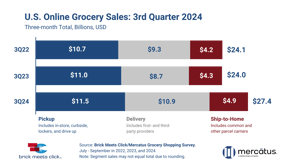2014 Prediction #9: Gestation Crate Promises Implemented
Next year, supermarkets will start walking the walk on their sow housing pledges.
December 17, 2013
Next year, supermarkets will start walking the walk on their sow housing pledges.
“In 2012 and 2013 we saw a slew of retailers — Costco, Kroger, Ahold, for example — make policies to eliminate gestation crates in their pork supply chains and now many of those companies are in the beginning stages of starting to actually convert their pork supplies away from gestation crates,” said Matthew Prescott, food policy director at the Humane Society of the United States, told SN.

INTRODUCTION
1. Outpacing Wal-Mart
2. Multicultural Offerings
3. E-Grocery Expansion
4. Small Fresh Formats
5. Dietitians in Demand
6. Functional vs. Nutritious
7. Pop-Ups Proliferate
8. Feeding Food Deserts
9. Sow Far Sow Good
10. Women in Produce
In fact, over the last couple of years nearly every large retailer announced it would be requiring pork suppliers to phase out the use of gestation crates. However, adjusting the supply chain will be a significant task for these chains.
“That represents a big commitment on the part of the retailers that will take some work to figure out, and so we’re seeing some companies now looking at how they are going to move in that direction in 2014 and beyond,” said Prescott.
Some retailers are ahead of the curve and already giving updates on their progress.
“For example, Safeway cited in this new policy that it has already converted all the pork in its eastern division to gestation-crate free, and it’s looking to add another division in 2014.”
Prescott noted that this update, linked directly to Safeway’s website home page, shows the growing importance of animal welfare issues to retailers.
“I think retailers are more than ever realizing that this is a central part of their corporate responsibility work and a central part of their operations, of course, food being — no pun intended — their bread and butter.”
Many restaurants and grocery stores are differentiating their brands by taking extra steps on animal welfare and sourcing transparency. Whole Foods, for instance, continues to raise its supplier standards across categories, with rating systems in the meat and produce departments.
Follow @SN_News for updates throughout the day.
But even for chains that don’t have a specific animal welfare focus, consumers are expecting more.
“We’ve seen an evolution in those retailers where they are more seriously tackling these issues and they are more seriously taking steps to eliminate at least the worst practices from their supply chains, like cages for egg-laying hens and gestation crates for pigs,” said Prescott.
About the Author
You May Also Like








